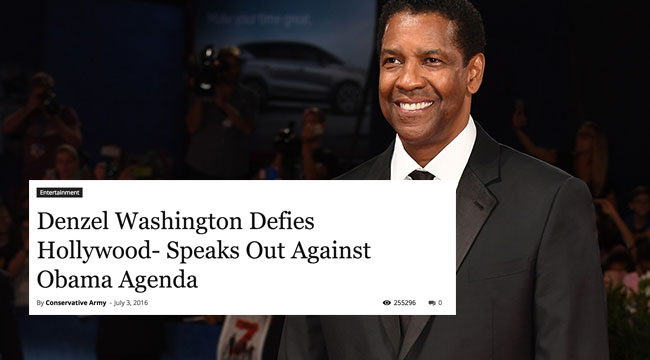
Denzel Washington has never endorsed Donald Trump. In fact, he actively raised funds for Hillary Clinton. Despite that fact, dozens of media outlets, and millions of people, have seen stories stating that Washington was all in on Trump. This is more than exaggeration or packaging. The story is fake, from headline to footer.
Fake news has been at the center of debate over the last few days, as many believed it helped sway the election. Mark Zuckerberg has strongly denied Facebook could ever influence something so huge, but his own employees disagree with him and are formulating guidelines for vetting websites — which they plan to bring to management. Despite Facebook’s professed lack of concern, the company is joining Google in removing ads from fake news sites. Which means this is probably being treated like a much bigger issue internally than we realize.
Still, that’s only half of the equation. We’ve already discussed the importance of piercing “filter bubbles” — aggregations of links and posts that cater solely to your beliefs and interests — but it’s also important to grasp how fake news, whether through malice or incompetence, spreads, and how it aggregates on Facebook and other sites. Here’s a step-by-step guide to how it works, and how to spot it.
Step 1: The Kernel Of Truth
The words that article puts in Denzel Washington’s mouth are completely real, they’re just not said by Denzel Washington. They’re said instead by Charles Evers, former Mississippi politician and brother of Medgar Evers, a civil rights leader assassinated by white nationalists in 1963.
How To Spot It: Simply copy-and-paste any quote you find that’s questionable into a search engine and see what comes up. If you do this with Evers, you’ll find the original New York Post interview as the second link. The first is a Snopes page debunking the article we’re analyzing.
Step 2: Deny and Obfuscate
We all learn the basics of journalism in high school: Who, what, why, where, and how. If you look closely at the many Denzel articles, which are virtually identical, you’ll notice that they open with the quote from Evers, a fabrication that Washington endorses Trump, and then quote from a Parade interview that ran nearly twenty years ago where Washington discusses his faith. Again, the kernel is there: Washington is, indeed, a devout Christian raised by a Pentecostal minister, and has been very open about his faith from the beginning of his career.
But again, he didn’t endorse Trump.
How To Spot It: Never trust an unsourced claim on the internet. Here’s a screengrab of one of many, many articles attempting to use Washington’s faith as a tool to put words in his mouth:
Notice the total lack of links. This is often a sign of a fake news site: If they’re not offering anything to back up a controversial or shocking statement, it’s likely because they don’t have anything.
Step 3: Bury The Truth
It should, in theory at least, be fairly simple to find the truth with a simple search. That’s why many fake news sites steal articles from each other, because it helps them bury what actually happened. Consider this, when we typed in “Denzel Obama” into Google and Bing:
There are credible results in there: Notice Bing’s top result is a debunking by the Washington Post, and a Snopes article taking apart this article is also among the top results. But line after line after line is a copy-paste-rewrite of this article, in both an attempt to draw eyeballs and an attempt to bury the debunkings that inevitably follow.
How To Spot It: Consider the sources. Have you ever heard of these sites? Do they have a clear partisan agenda in their name? What else comes up when you look at the source? Does it feel legit, or like it was assembled by a chatbot?
Step 4: Wait For Facebook To Take Over
One thing to remember is sites like this specialize in telling people what they most want to hear. Sure, you can buy Facebook likes by the bushel, but in most cases, these sites rely on social media to spread the page. To Facebook’s credit, the same “Denzel Obama” search term we use brings up one link, debunking that claim, but that’s not something many of those 10,000 Like-ers will ever bother to research.
How To Spot It: Facebook has been doing a better job of inserting relevant links underneath articles like this, but you really need to apply all the steps we’ve listed above. While Facebook may be pulling ads from sites like this, unless they begin filtering out fake news entirely, it’s going to be up to us to vet our information.
The misuse and abuse of the internet is always going to be with us. There’s simply no way to stop it, short of turning into a digital dictatorship. Preventing the spread of fake news and the hate it can produce is a job we all have to pitch in to do. When we see fake news, we need to call it out as such, source a link for the truth, and tell our friends. We can’t expect algorithms and those who profit from fake news to serve the public good. It’s our responsibility, and we need to claim it.
